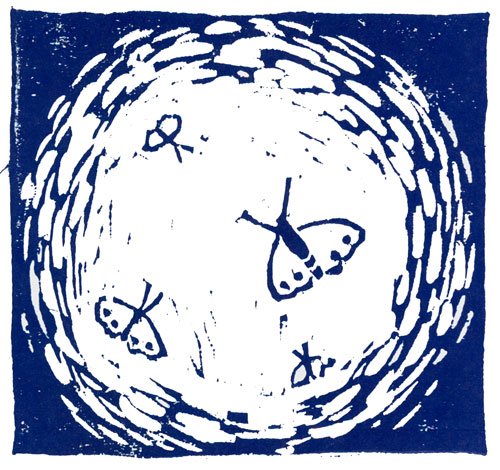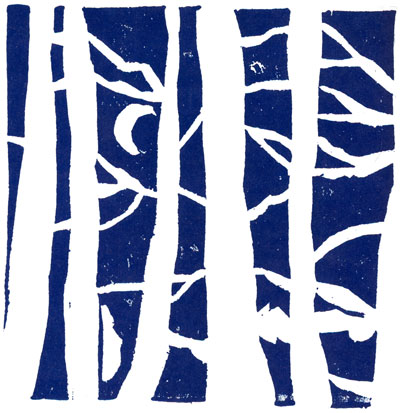Don’t follow the old masters’ footsteps,
seek what they sought.To learn about pine trees, go to the pine tree;
to learn of the bamboo, study bamboo.Old pond
frog jumps in
the sound of water.
Whether in his poems or in his teachings about poetry, Basho sets forth his useful reminder with an incomparable and elegant simplicity: see for yourself, hear for yourself, enter deeply enough this seeing and hearing and all things will speak with and through you. One of Basho’s abundant gifts was the equality with which he met every form of existence: “Plants, stones, utensils, each thing has its individual feelings, similar to those of men.” For Basho, the path is through: entering deeply into the cry of a duck or a hototogitsu, chewing dried salmon or eating lettuce with worn-down teeth, watching a nectar-drunk bee emerging from a peony, the poet—or any person—can awaken into the true nature of the self, the splash of this moment’s water. Between frog, pond, water-sound, poet: no separation.
For most of his life, Basho (1644-1694) supported himself by guiding other writers: compiling anthologies, commenting on his followers’ poems, receiving gifts of clothing and housing from those who admired and emulated his work. He took a kind of verse that had been close to a parlor game in its intentions and made of it a vehicle for understanding everyday life in a new way: bringing the surrounding commons, in which unnoticed life takes place, into interiority and depth. From the record we have of his teaching and approach to poetry, it is clear that he concerned himself, wanderer that he was in every sense, no less with the destination (a poem’s words, that is) than with the quality of the traveler’s attention: “Nothing is worthy of writing down unless it is seen with fresh eyes.” The process mattered. There are two ways poems happen, Basho counseled his students: some poems are made by technique, others arise as if of themselves, the poet virtually becoming the thing observed. We can see his opinion of the poem created solely by the writer’s will: “If we were to gain mastery over things, we would find that their lives would vanish without a trace.”
Yet even while foregoing any ambition of “mastery,” the path of poetry, like the path of Buddhist practice, is not without effort, requiring a concentration sufficiently deep to erase its own marks. A formal student of Zen who practiced at an Edo temple under the teacher Butcho, Basho learned the mind of meditative freshness equally from the study of earlier poets-the Chinese poets of the Tang Dynasty and especially the twelfth-century Japanese Buddhist priest Saigyo. “Saigyo in waka poems, Sogi in renga (linked verse), Sesshu’s paintings, Rikyu’s tea ceremony: all are moved by a single spirit,” one of Basho’s diaries begins, “The spirit of one who follows nature and its passing seasons.” From each of these expressions of the way, Basho learned the path of immersion and interconnection. Only when the space between poet and object has disappeared can the object be truly perceived, Basho taught his students, adding that for one who sees, there is nothing that does not become a flower, a moon. And so the writers of haiku could bring into the tradition of Japanese literary imagery a new possibility for the homely—a crow pecking up mud snails from between a rice paddy’s plants was Basho’s suggestion for haiku’s proper subject.
Waking mid-night—
the water jar cracks
in the freezing cold
The authority of Basho’s poetry is the authority of the world itself; yet the world of the poems is one that doesn’t exclude the human perception, feeling, and understanding through which they come into being. “Silence— / the cicada’s cry / falls into stone.” The poem describes what cannot be heard by following the hearable sound into its immoveable disappearance. In another version, the opening subject, “Silence,” is changed to “Loneliness.” Yet it would be a mistake to think one version more (or less) human-centered than the other. For Basho, as for Robinson Jeffers, human beings are not the center, bur coexistent with the rest of being.

It occurs to me that Basho’s description of the way of poetry can be thought of as offering a mirror-path to Dogen’s famous teaching that “to study the way is to study the self; to study the self is to forget the self; to forget the self is to awaken into the ten thousand things.” The haiku poet studies the ten thousand things one by one, going deeply into each in its particular, fleeting expression at the moment of the poem’s composition. In doing so, the poet forgets the self and enters, for that moment, a practice indistinguishable from Shakyamuni’s when, after long sitting under the Bo tree, he saw the morning star and touched the earth, saying as he did, “With this star all things and I awaken.” After, there is nothing to cling to: daylight comes, the Buddha stands up. And the haiku writer? “The poem,” Basho suggested, “only exists while it’s on the writing desk.” By the time the ink has dried, “it should be recognized as a mere scrap of paper.”
Autumn deepening
my neighbor
what does he do?At the fishmongers
a salt-cured bream
with frozen-looking lips.This inn
where prostitutes sleep too—
bush dover and the moon.
What poetry teaches—all poetry, not only those poems that come from Buddhist traditions—is the interconnection and inseparability of being. Intimacy and connection-made-by-words are poetry’s skeletal structure, its lungs, muscle, and nerves. Basho’s poems show this intimate perception of co-arising with a few deft strokes—there is no time in a haiku to spell out the nature of relationship, yet always relationship is present. On his deathbed, the poet wonders about his neighbor with still-living sympathy; in a fish store, he perceives the fish’s body as keenly and sensually as if it were his own—first the salt cures the reader’s lips, then the cold. In a life, as in an inn, one core sides equally with every kind of person. Whether perceived with good-natured humor or a heart almost worn out past sorrow, “not one, not two” is the core flavor of Basho’s haiku, the dynamic of its insight and its transmission. In one teaching dialogue, Basho instructed, “The problem with most poems is that they are either subjective or objective.” “Don’t you mean too subjective or objective?” his student asked; the teacher clarified, simply, “No.”
Poetry: in summer, a fireplace; in winter, a fan.
Eat vegetable soup, not duck stew.
Plainness and oddity, Basho counseled, are the bones of haiku. The poet seeks our not the exotic for its own sake, but the ordinary for its surprising revelations. Consider the first of these statements: A fan, a fireplace, are common things, yet in poetry they are called on not to temper the discomfort of daily living, but to intensify it. When you are hot, be hot. Poetry is not, for Basho, a path of amusement or consolation, but the cultivation of a ceaselessly “windswept spirit.”As for the way of poetry, it was never a “career” for Basho. When he returned to the capital after a long absence and found his former students had created a thriving literary scene, he turned away in disgust. Near the end of his life, he locked his gate for a month, the only way to find freedom from his admirers, whose visits eroded the very thing in him they sought.
“The invincible power of poetry has reduced me to the condition of a tattered beggar,” Basho wrote. A man of fragile health, prone to depression, Basho meant this statement literally. One haiku expresses gratitude for the gift of a pair of new straw sandals, with straps the color of blue iris, as he sets forth once more on a journey, and he noted that he was quite safe from robbers, as he carried with him nothing of value to anyone. Yet the statement speaks to his life also at another level: how the poet’s existence is a necessary opening to dependence, as Nell as to interdependence. “A disciple of the Buddha does not take what is not given,” says one of the ten prohibitory precepts. Basho’s haiku are the record of what the world placed in the open begging bowl of his perceptions. Had the poet’s mind been filled with an idea of self, an idea of world, there would have been no room for what he saw to find new life in his words.
As for Basho’s official status in the world, in his Diary of a Weather-Beaten Skeleton he wrote this account: “I may look like a priest, but I am a layman; although I am a layman, my head is shaved.” He valued the fruitless plantain tree planted outside his dwelling for the very uselessness of its wood and wind-torn, ragged leaves—as poetry, too, is useless, if what you are looking for in this life is simple shelter.
Thank you for subscribing to Tricycle! As a nonprofit, we depend on readers like you to keep Buddhist teachings and practices widely available.
